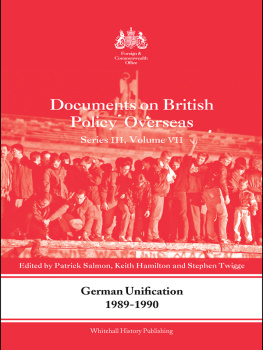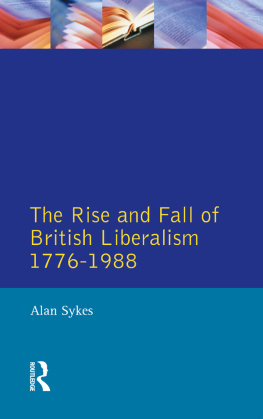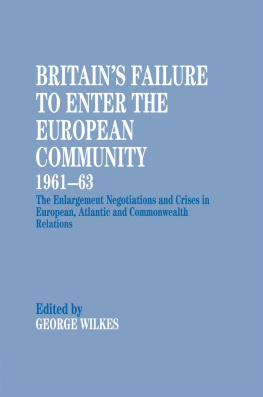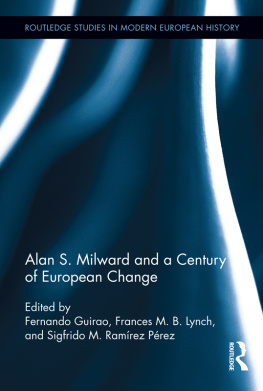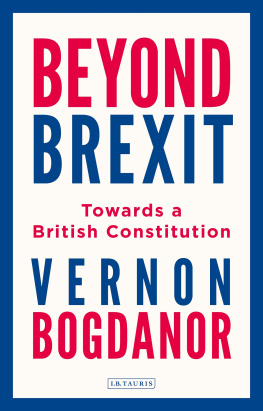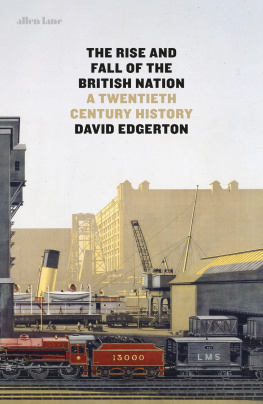The UK and The European Community, Vol. 1:
THE RISE AND FALL OF A
NATIONAL STRATEGY
19451963
GOVERNMENT OFFICIAL HISTORY SERIES ISSN: 14748398
The Government Official History series began in 1919 with wartime histories, and the peacetime series was inaugurated in 1966 by Harold Wilson. The aim of the series is to produce major histories in their own right, compiled by historians eminent in the field, who are afforded free access to al1 relevant material in the official archives. The Histories also provide a trusted secondary source for other historians and researchers while the official records are still closed under the 30-year rule laid down in the Public Records Act. The main criteria for selection of topics are that the histories should record important episodes or themes of British history while the official records can still be supplemented by the recollections of key players; and that they should be of general interest, and, preferably, involve the records of more than one government department. Also part of the programme are the remaining volumes from the Second World War series.
The United Kingdom and the European Community
Vol. 1: 1be Rise and Fall of a National Strategy, 19451963
Alan S. Milward
Secret Flotillas
Sir Brooks Richards
SOE and France
M. R. D. Foot
The official History of the Falklands Campaign
Vol. 1: the Origins of the Falklands Conflict
Vol. 11: 1be 1982 Falklands War and its Aftermath
Lawrence Freedman
First published in 2002 in Great Britain by
FRANK CASS PUBLISHERS
Crown House 47 Chase Side,
London N14 5BP
and in the United states of America by
FRANK CASS PUBLISHERS
c/o ISBS 5824 N.E. Hassalo Street
Portland, Oregon, 972133644
Website www.frankcass.com
Transferred to Digital Printing 2005
Crown Copyright 2002
British Library Cataloguing in Publication Data
Milward, Alan S. (Alan Steele), 1935
The United Kingdom and the European community
Vol. I: the rise and fall of a national strategy, 19451963
Alan S. Milward. (Cabinet Office peacetime histories)
1. European Economic Community 2. Europe Economic
integration 3. Great Britain Politics and government
1945
I. Title
337.142
ISBN 0-7146-5111-7 Ccloth)
ISSN 1474-8398
Library of Congress Cataloging-in-Puhlication Data
Milward, Alan S.
The United Kingdom and the European community / Alan S. Milward
v; cm. (Government official history series, ISSN 14748398)
Includes bibliographical references and index.
Contents: v. 1. The rise and fall of a national strategy, 19451963
ISBN 0-7146-5111-7 Ccloth: v. 1)
1. European Economic Community-Great Britain. 2. Great
Britain-Relations-Europe. 3. Europe-Relations-Great Britain. 4. Great
Britain-Foreign relations-Europgn. Europe-Foreign relations--Great Britain. 6. Great
Britain-Economic policy-19451964. 7. Great Britain-Politics and government-19451964
I. Title. II. Series
HC241.25 G7 M48 2002
337.4104c1c21
2002018817
Published on behal of the Wbitehall History Publishing Consortium. Applications to reproduce Crown copyright protected material in this publication should be submitted in writing to: HMSO,
Copyright Unit, st clement House,216 colegate, Norwich NR3 IBQ
Fax: 01603 723000. E-mail: copyright@hmso.gov.uk
Typeset by FiSH Books, London
The author has been given full access to official documents. He alone is responsible for the statements made and the views expressed.
CONTENTS
The European Defence Community and the European Political
Community, 195054
The Decision Not to join the European Economic
Community, 195355
Preserving British Influence? The United Kingdom, the
Commonwealth and the EEC
Suzerainty, Economic Development and International Trading
Systems: The Unattainable Vision
Paying for the Community: British Agriculture, Food Supply and
the Common Agricultural Policy
Preface
What should an Official History be? At one level an answer is obvious. Because its author has the great privilege of access to all the official documentation which he or she requests to see, there exists an obligation to give as full a history of the subject as possible. Guidelines for the Official History of the United Kingdoms entry into the European Community were drawn up by a committee of the Privy Council. They specify a history of British policy towards the European Community as it evolved, a history of public opinion on that issue, and a history of the impact of the European Community on the daily life of British citizens.
Government records themselves deal mainly with the formulation of policy. The range of government departments involved in formulating policy towards the European Community widened rapidly once possible membership became an object of policy. Membership once attained, government departments whose contribution to making national policy lay mostly in a specialised area of a lesser importance nationally than, for example, finance or foreign affairs were by no means always of a lesser importance in making policy towards and in the European Community, the Ministry of Agriculture, Fisheries and Food being the prime example. The history of the United Kingdoms attempts to gain entry covered twelve and a half years and this change began with the long and failed negotiation for entry which started in 1961. Even a history confined to policy formulation requires, by the mid-1960s, a systematic search through the records of an ever-increasing number of ministries.
There being self-evidently no way in which all the work necessary to meet the Privy Councils guidelines could be compressed into one volume, I have written a first volume which goes as far as the time when entry into the European Communities, in the plural as they then were, became government policy, in the sense that no alternative policy was able effectively to displace it as a choice. Ironically, this became the situation when the United Kingdoms first application was refused in 1963. I could thus reserve an important part of the Privy Councils guidelines for a second volume.
There was another reason for this chronological division. This first volume deals with the period for which several well-founded histories of Britains policy towards the European Community have already been published. Most of the records for this period are freely accessible to anyone. If this first volume can add significantly to what is already known, it is more by its fullness than by any privilege bestowed on its author, or by the views of its author.
Some of those views are about the European Community itself. Until at least 1963, I see the European Communities not primarily as the outcome of an emotional and political programme to replace the long domination of separate national states over the European continent by some form of federal, supranational governance, but as a set of stochastic, high-level, political bargains between some of those states whose primary purpose was to enhance the position of the nation-state itself. These bargains can be understood as furthering the national strategies of their signatories. Political sentiment in favour of a united Europe could, in some countries, be utilised to further the achievement of national strategy through these bargains. Such sentiment was not, however, a significant or influential aspect of British political thought or action in this period. There was indeed an almost complete absence of any public opinion in the United Kingdom about the European Communities until 1962, by which time the negotiations for entry had already been underway for nine months. British government policy before then could be pragmatically formulated by a long-and well-established professional policy-making machine. Pragmatic is not a synonym for wise, so I have made it my business to decide as far as possible what was wise and what was unwise.


